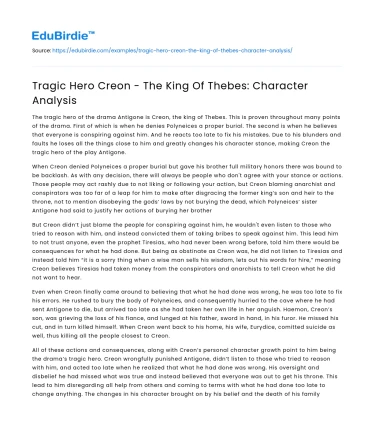The tragic hero of the drama Antigone is Creon, the king of Thebes. This is proven throughout many points of the drama. First of which is when he denies Polyneices a proper burial. The second is when he believes that everyone is conspiring against him. And he reacts too late to fix his mistakes. Due to his blunders and faults he loses all the things close to him and greatly changes his character stance, making Creon the tragic hero of the play Antigone.
When Creon denied Polyneices a proper burial but gave his brother full military honors there was bound to be backlash. As with any decision, there will always be people who don't agree with your stance or actions. Those people may act rashly due to not liking or following your action, but Creon blaming anarchist and conspirators was too far of a leap for him to make after disgracing the former king’s son and heir to the throne, not to mention disobeying the gods’ laws by not burying the dead, which Polyneices’ sister Antigone had said to justify her actions of burying her brother
But Creon didn’t just blame the people for conspiring against him, he wouldn't even listen to those who tried to reason with him, and instead convicted them of taking bribes to speak against him. This lead him to not trust anyone, even the prophet Tiresias, who had never been wrong before, told him there would be consequences for what he had done. But being as obstinate as Creon was, he did not listen to Tiresias and instead told him “it is a sorry thing when a wise man sells his wisdom, lets out his words for hire,” meaning Creon believes Tiresias had taken money from the conspirators and anarchists to tell Creon what he did not want to hear.
Even when Creon finally came around to believing that what he had done was wrong, he was too late to fix his errors. He rushed to bury the body of Polyneices, and consequently hurried to the cave where he had sent Antigone to die, but arrived too late as she had taken her own life in her anguish. Haemon, Creon’s son, was grieving the loss of his fiance, and lunged at his father, sword in hand, in his furor. He missed his cut, and in turn killed himself. When Creon went back to his home, his wife, Eurydice, comitted suicide as well, thus killing all the people closest to Creon.
All of these actions and consequences, along with Creon’s personal character growth point to him being the drama’s tragic hero. Creon wrongfully punished Antigone, didn’t listen to those who tried to reason with him, and acted too late when he realized that what he had done was wrong. His oversight and disbelief he had missed what was true and instead believed that everyone was out to get his throne. This lead to him disregarding all help from others and coming to terms with what he had done too late to change anything. The changes in his character brought on by his belief and the death of his family makes Creon the tragic hero of the play Antigone.






 Stuck on your essay?
Stuck on your essay?

